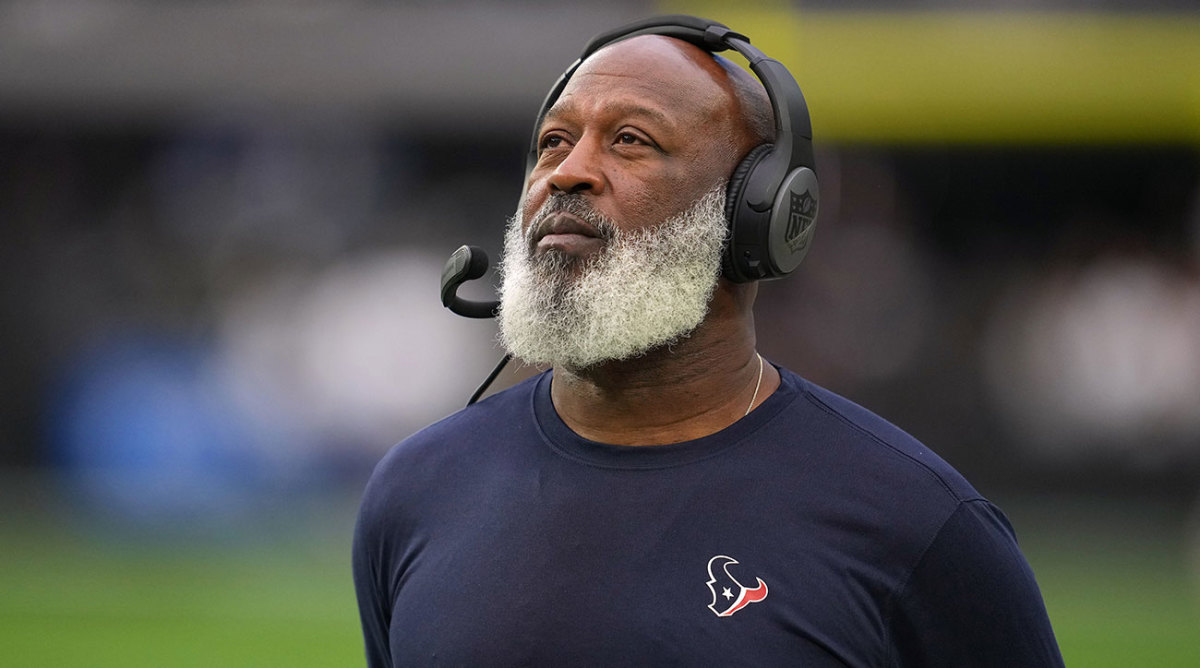The Texans Job Actually Looks Desirable to Potential Coaches, If You Can Stomach Why It’s Open
When a coach gets fired from what appears to be an absolute circus of a job, most people will ask: Who on Earth would sign up for that next?
In certain cases, the inclination is correct. In Denver, for example, would you gamble the most important moment of your career on fixing Russell Wilson? In Indianapolis, would you ever feel truly comfortable, given what the owner did to Frank Reich this year?
But with the Texans, who opened up the postseason carousel with the firing of Lovie Smith on Sunday night, we might be thinking of it the wrong way.
It’s not about: Who is going to take this job now?
It’s more like: Who was always meant to get this job in the first place?

This now makes back-to-back one-and-dones in Houston, three new coaches in three years. I don’t think it’s wild to assume that David Culley, whose contract was bizarre and potentially more in line with that of a coordinator, and Smith were not the building blocks of an organization that was aggressively building a war chest of young talent and draft equity. The former had to handle constant questions about Deshaun Watson. The latter had to try to maximize what may have been among the worst opening-day rosters in the NFL. Admirably, both won a few football games and stayed competitive.
I think it is safe to assume that whoever the Texans hire this year will be the person they hoped could use all of that capital and mold those young players, a crop that could potentially include the first quarterback selected in this year’s draft. In that regard, I don’t really think the Texans are going to have a problem hiring a coach at all. In fact, it’s probably going to be a great gig. A future No. 1 cornerback in Derek Stingley Jr. A talented running back in Dameon Pierce. Potentially Alabama QB Bryce Young under center.
Eagles defensive coordinator Jonathan Gannon, 49ers defensive coordinator DeMeco Ryans and Patriots linebackers coach Jerod Mayo should all be considered strong candidates. Gannon was impressive in his interview with the Texans last year, while Ryans is viewed by some as the slam dunk candidate of the cycle. Ryans played in Houston from 2006–11.
Without a centralized, unionized body protecting coaches and looking out for their collective best interests (something that will never happen), firings like the one in Houston will be commonplace in an NFL that gently allows its franchises to field less-than-competitive rosters in order to build more competitive ones down the road. In recent years, we have seen several accusations of “bridge” coaches, from Hue Jackson to Steve Wilks, like we’ve often seen at the quarterback position. In most cases, the rhythm of these hirings is frighteningly similar. They get swept up in a seemingly wayward hiring process, thrust into a season with a less-than-ideal solution at quarterback (Smith, God bless him, was juggling between Davis Mills, Jeff Driskel and Kyle Allen) and placed in a position where they can do little but steer the car off a cliff to someone else’s advantage.
Perhaps Smith doesn’t see it that way, but if we were in the business of recognizing patterns, this would slide neatly into place.
So it goes for an enterprise that will move on quickly. If one had to rank the best available coach openings, a team in a very winnable division with carte blanche to select a quarterback toward the top of the draft and spend one of the 10 biggest troves of salary cap space in the NFL seems like a pretty good deal. This is especially true given that if general manager Nick Caserio were to require hiring a third consecutive coach after just one season, he would undoubtedly cost himself his own job.
And this is really where we’ll see differences. Caserio fired Culley after he won four games with this Texans team. He fired Smith after winning three and tying another. Neither was deemed worthy of patience, despite the fact that Caserio hired Culley and Smith, and that Smith was on the coaching staff for a year before being promoted to the full-time head-coaching position. What was outlined in those interviews? This was, in the eyes of some around the NFL, at least a three-year build. How come no one even got halfway there?
We will find out soon enough. For once, the Texans gig is going to be a good one, so long as you can stomach how it got that way.
